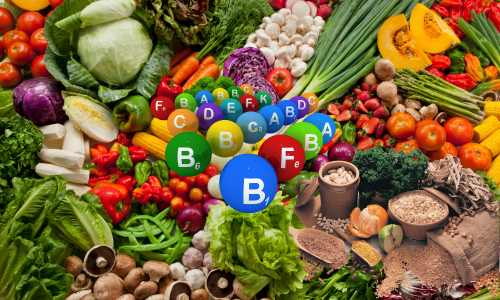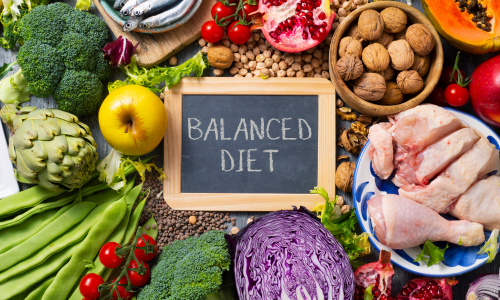Nutrition
Achieving Optimal Nutrition for Improved Health
Introduction

At BeHealthyHappy.com, we are dedicated to providing valuable insights and solutions for achieving optimal nutrition and improving overall health. Our comprehensive approach combines scientific research, expert guidance, and practical strategies to help individuals make informed choices about their diet and nutrition. In this article, we will explore the key elements of a well-balanced diet, debunk common myths surrounding nutrition, and provide actionable tips to help you optimize your nutritional intake.
The Foundation of a Healthy Diet
A healthy diet forms the cornerstone of optimal nutrition. It encompasses a wide range of essential nutrients, including macronutrients (carbohydrates, proteins, and fats) and micronutrients (vitamins and minerals). By consuming a variety of nutrient-dense foods, you can ensure that your body receives all the necessary components for growth, development, and overall well-being.

Macronutrients: Fueling Your Body
- Carbohydrates: Carbohydrates are the primary source of energy for your body. They are found in foods such as grains, fruits, vegetables, and legumes. Choosing complex carbohydrates, such as whole grains, helps sustain energy levels and promotes satiety.
- Proteins: Proteins are essential for tissue repair, muscle growth, and immune function. Good sources of protein include lean meats, poultry, fish, dairy products, legumes, and nuts. Incorporating a variety of protein sources into your diet ensures a diverse amino acid profile.
- Fats: Healthy fats play a crucial role in supporting brain function, hormone production, and nutrient absorption. Opt for unsaturated fats found in avocados, nuts, seeds, and olive oil, while limiting the intake of saturated and trans fats.

Micronutrients: The Power of Vitamins and Minerals
- Vitamins: Vitamins are organic compounds that your body needs in small amounts to function properly. They play essential roles in metabolism, immune function, and overall health. Ensure a diverse intake of fruits, vegetables, and whole grains to obtain a wide spectrum of vitamins, such as vitamin C, vitamin A, and the B vitamins.
- Minerals: Minerals are inorganic substances required for various bodily functions, including bone health, nerve transmission, and fluid balance. Incorporate mineral-rich foods like leafy greens, dairy products, nuts, and seeds into your diet to meet your daily mineral requirements.
Debunking Nutrition Myths
There are numerous misconceptions surrounding nutrition that can hinder individuals from achieving optimal health. Let’s address some common myths and provide evidence-based information to set the record straight.

Myth 1: “Carbohydrates are always bad for you.”
Carbohydrates are often unfairly demonized, but not all carbs are created equal. While highly processed and refined carbohydrates should be limited, whole grains, fruits, and vegetables provide vital nutrients and fiber that contribute to a healthy diet.
Myth 2: “Eating fat makes you fat.”
Contrary to popular belief, consuming healthy fats in moderation does not directly lead to weight gain. In fact, healthy fats can promote satiety and help control cravings, ultimately supporting weight management when incorporated into a balanced diet.
Myth 3: “Skipping meals helps with weight loss.”
Skipping meals can disrupt your body’s metabolism and lead to overeating later in the day. It is important to maintain regular, balanced meals and snacks to provide your body with a steady supply of nutrients throughout the day.
Actionable Tips for Optimal Nutrition
Now that we have debunked some nutrition myths, let’s delve into actionable tips to optimize your nutritional intake and support your overall health.
Tip 1: Prioritize Whole, Unprocessed Foods
Choose whole, unprocessed foods whenever possible. They are typically more nutrient-dense and provide a broader range of essential vitamins and minerals compared to processed alternatives. Fill your plate with colorful fruits, vegetables, whole grains, lean proteins, and healthy fats.
Tip 2: Practice Portion Control
Portion control plays a crucial role in maintaining a healthy weight and preventing overeating. Use smaller plates, measure your servings, and listen to your body’s hunger and fullness cues. Avoid eating until you feel uncomfortably full.
Tip 3: Stay Hydrated
Hydration is key to optimal bodily functions. Aim to drink an adequate amount of water throughout the day and limit sugary beverages. If you struggle with plain water, infuse it with fresh fruits or herbs to add flavor without added calories.
Tip 4: Engage in Regular Physical Activity
Physical activity complements a healthy diet by supporting weight management, improving cardiovascular health, and boosting mood. Find activities you enjoy and aim for a combination of aerobic exercise, strength training, and flexibility exercises.

Conclusion
At BeHealthyHappy.com, we firmly believe that achieving optimal nutrition is a vital component of overall health and well-being. By following a well-balanced diet, debunking nutrition myths, and implementing actionable tips, you can take significant strides toward optimizing your nutritional intake. Remember, small changes can lead to significant long-term benefits. Embrace the power of nutrition and embark on a journey to a healthier, happier you.
